Status report of NATIONAL RESEARCH CENTRE ON YAK
Yak, the hairy bovine of snow covered high altitude had long linkage with the mankind inhabiting in the remote mountainous regions of India, Bhutan, China, Mongolia and other parts of central Asia. It is a multipurpose animal, and provides milk, meat, fibre, hide and dung. The yak is also used as pack animal for the transportation of household goods and also for riding. Although yaks are being used for long by the people living in very remote areas of the high altitudes of Himalaya, the information on various aspects of yak husbandry is very meager. Realizing the importance of this animal, Indian Council of Agricultural Research had established National Research Centre on Yak in 1989 at Dirang, West Kameng District of Arunachal Pradesh for improvement of this species through scientific breeding, feeding and management. Yak husbandry facing newer challenges because of impending climatic changes which influence on the performance of animals, and the National Research Centre on Yak (NRCY) had attempted to deal with researchable issues with due care and attention since its inception with well planned systematic study. NRCY could mark the beginning in devising different technologies pertaining to in-situ and ex-situ conservation through application of reproductive biotechnologies, like Artificial Insemination (A.I), Embryo Transfer Technology (ETT), and taking appropriate scientific measures like nutritional intervention, management practices, establishment of high land pastures etc. Due attempt has also been made to commercialize the yak products technology, like designer paneer etc.
During the last one year under DBT sponsored project significant achievements were made in respect of in vitro production of pure yak embryos up to blastocyst stage and yak hybrid embryos up to morula stage, and few blastocysts and morula were transferred to recipient yaks. Another achievement of the Institute is management of growing yaks at Mandala village (10,000 ft above msl) belonging to 'Brokpas' by nutritional intervention in winter months. Many 'Brokpas' were convinced that in winter months also optimum production can be maintained by low cost technology developed by the Institute. Hence, all the research and extension programmes pertaining to yak husbandry conducted by this centre have been aimed for nutritional security and economic upliftment of farmers, and to make the yak husbandry sustainable for the highlanders.
Salient Achievements of the Institue:
Livestock Improvement:
Genetic characterization of yaks for morphological and productive traits indicated high genetic variability in production and reproductive traits. Five types of yaks have been identified based on phenotypic characteristics. Selective breeding is being carried out to improve the performance of yaks.
Study was conducted on growing yak calves for 112 days revealed that, feeding of paddy straw based complete feed block (CFB) (40% paddy straw, 21% maize grain, 5%, wheat bran, 16% mustard cake, 12% groundnut cake, 3% molasses, 2% mineral mixture and 1% common salt) was found to improve in economic traits compared to yaks allowed for free grazing during winter season. To study the effect of plane of nutrition, four types of ration and average daily gain and feed conversion efficiency was the highest in yaks fed on high protein-high energy ration.
Ante-partum administration of vitamin E and selenium in yaks was found to reduce the time of placental expulsion, calving abnormalities, increased neonatal birth weight and reduced calf mortality compared to untreated yaks. Area specific mineral mixture formulation for yak feeding is prepared with zinc (Zn), copper (Cu), cobalt (Co) and manganese (Mn) in the ratio of 40:20:2:1. Optimum performance with economic advantage was achieved in growing yaks on feeding Complete Feed Block supplemented with limiting micro-nutrients.
Reproductive Management:
Cryopreservation of yak semen has been sedenterized and AI is successfully practiced. ETT in yaks has been standardized, and a calf by ETT was born at the Centre for the first time in the World. Yak and yak hybrid embryos could be produced in vitro up to blastocyst and compact morula stage, respectively, and cryopreserved by vitrification.
A study was conducted to find out relationship between postpartum metabolism and resumption of ovarian activity in female yaks. Postpartum yaks were examined twice weekly by ultrasonography, starting from 4 weeks post calving until the onset of cyclicity. It was observed that, follicular development and growth started in early postpartum and incidence of ovulation of first dominant follicle was low. However, follicular cyst was observed in 15% animals on day 28, 49 and 112 post calving, respectively.
Ultrasound guided ovum pick up (OPU) has been standardized in yaks and percentage recovery of A and B category oocytes was 59.09 and 22.73, respectively, with an average oocytes recovery of 1.47 per animal. Maturation of oocytes was found to be 71.43% with subsequent in vitro fertilization rate of 42%, using in vitro capacitated yak frozen sperm, which gave cleavage up to the stage of morula and blastocysts. Embryos were further cryopreserved and subsequently two of them were transferred to suitable recipients.
Molecular Dissection:
Two different single stranded conformation polymorphism (SSCP) phenotypes of toll like receptor 2 (TLR2) were identified on the basis of band sharing index. Presence of polymorphism in these relatively conserved domains of genome seems to be significant because earlier studies revealed that, Indian yaks showed considerable monomorphism in other candidate gene loci.
Animal Health:
First global report of cutaneous papillomatosis in yak has been confirmed through sequence information of proviral partial gene for capsid protein. Mammomonogamous laryngeus affects ruminants and human being as well. An egg of this parasite has been identified for the first time in Indian yak during coproscopy. Average arsenic (As) concentration in water in various spots of West Kameng district of Arunachal Pradesh were below permissible limit as per national standard (50 ppb) but higher than that of World Health Organization (WHO) standard (10 ppb).
Extension Activity:
An awareness camp on "Benefit of Synchronization of Ovulation and Fixed Time Al" organized at Lubrang - Brokserthung village, West Kameng district, Arunachal Pradesh. A total of 15 yak rearers participated in the training programme on 8th May, 2011. An extension-cum-animal health camp was organized at Lubrang-Brokserthung village, West Kameng district, Arunachal Pradesh. More than 250 yaks, yak-cattle hybrids and hill cattle were treated during the camp on 13"' May, 2011.
A three days campaign entitled "NRC on Yak at Brokpas Door Step" was organized at Sela, Bangajung, Mirba, Mukto, RA-3 and Jawantgarh area of Tawang district. During this campaign more than 300 yaks and yak-cattle hybrids were treated and yak rearers were made aware about the "Scientific Yak Rearing" and Innovations of scientists of NRCY from 4th to 6"' July, 2011.
One day Farmers Training-cum-Field Demonstration Programme on "High Altitude Pasture Development and Fodder Conservation" was organized. A total of 21 yak rearers took part in this training programme on 14th July, 2011.
An animal health camp was organized at Mouteng grazing ground, Tawang. More than 300 yaks and yak-cattle hybrids were treated during this camp. This camp was organized with the help of Nguiphoo Charitable Society on 14`h July, 2011.
An extension-cum-animal health camp was organized at Misopsa, Mandala. More than 300 yaks and yak-cattle hybrids were treated for various ailments on 11"' November, 2011. "Stakeholders meeting" was held on 10th January, 2012. A total of 18 farmers from Arunachal Pradesh and 3 farmers from Sikkim participated in the meeting. An extension-cum-yak health camp was organized at Nyanphoo, Mandala on 1st February, 2012. Around 100 pure yaks were treated for various diseases. Besides these, yak rearers were made aware of various scientific methods of yak rearing.
NRCY participated in the North Eastern-Agri Fair at Assam Agricultural University, Khanapara, Guwahati from 10th to 13`h February, 2012. NRCY participated in the "Know your Army Mela" at Jung, Tawang district of Arunachal Pradesh on 26"' February, 2012. Farm innovators day was organized. A total of 69 farmers from different places of West Kameng and Tawang districts of Arunachal Pradesh participated in this auspicious occasion from 3rd to 4th March, 2012. NRCY participated in" Know your Army Mela" at St. Lopon Stadium, Dirang from 10 to 11th March, 2012. Training on "Scientific Husbandry Practices for High Altitude Animals" was organized. A total of 65 yak rearers participated in this training programme from 16-18th March, 2012.
Training-cum-demonstration conducted for first aid approach for yak and yak herders. A total of 44 yak rearers participated in this programme on 19th and 25th March, 2012. A farmers training on "Scientific Dairy Farming" was conducted at Mahadevpur, Lohit district, Arunachal Pradesh in collaboration with KVK, Lohit district and Animal Husbandry and Veterinary Department, Government of Arunachal Pradesh. A total of 41 farmers participated in this programme from 21- 23rd March, 2012. Training programme on "Scientific Feeding and Managemental Practices for High Altitude Animals" was conducted at NRC-Yak, Dirang from 23rd to 25th March, 2012. A total of 32 yak rearers participated in this training programme.
Two days training programme on "Awareness about Zoonotic Diseases" was conducted at NRCY, Dirang from 24th to 25th March, 2012. Three days training programme on "Disease Management of High Altitude Animals" was conducted in the Tawang district of Arunachal Pradesh in collaboration with Nguiphoo Charitable Society. A total of 42 yak farmers participated in this training programme from 27th to 29th March, 2012.
A "Capsule training on Yak Milk and Hair Product for Tribal Women" was conducted on 28th March, 2012 at NRCY. A total of 51 tribal women participated in this programme. Field demonstration on urea ammoniation of paddy straw and high land pasture development was conducted at Lubrang village on 31st March, 2012. A total of 23 participants attended in this programme.
KVK, Lohit under NRC-Yak has made front line demonstration (FLD) on Duck-cum-Fish Culture, Soil nutrient management, High Yielding Varieties on Broccoli (HYV Broccoli), and Oyster Mushroom. Duck-cum-Fish Culture has been popular and twenty five farmers self help groups from thirteen villages have been selected. Presently the package has become very popular and fish farmers are this integrated farming system. Soil nutrient management has been popularized among the farmers by the use of "Vermicompost". Farm school on integrated fish-cum-pig farming has been initiated and incontrovertible response is expected soon.
Publications and Presentations:
A total of 44 research papers were published in Indian and foreign journals. Other major publications of the institute are: Book Chapters (10), Research Abstracts (19), EMBL-bank submissions (4), Popular/ Technical article (6), Leaflet/Folder (2), Training Manual (3), Newsletter (4) and Annual Report (2).
Photos of NRC YAK Arunachal Pradesh
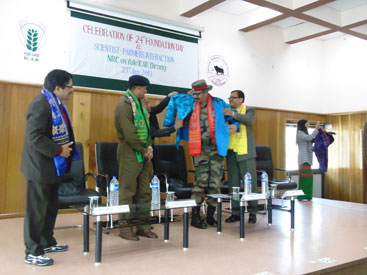 |
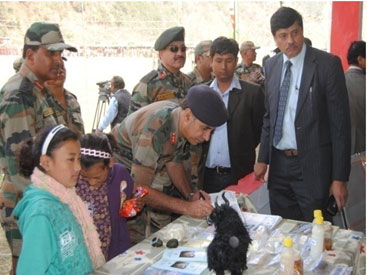 |
| 24th Foundation day celebration of NRC on Yak | Army Mela |
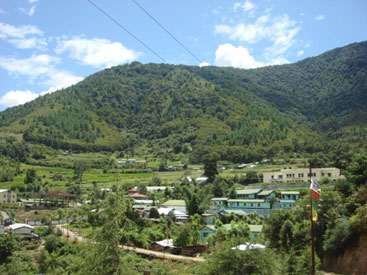 |
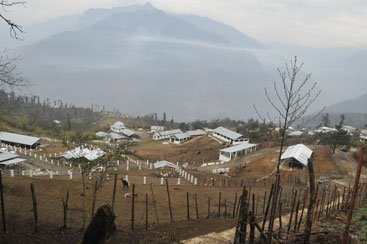 |
| Bird eye view of NRC on Yak campus Dirang | Bird eye view of NRC on Yak Farm, Nykmadung Campus |
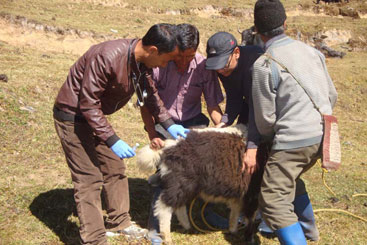 |
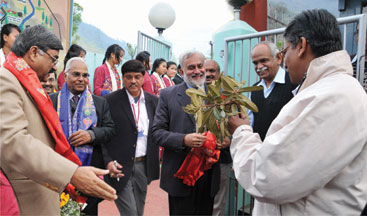 |
| Collaborative mass vaccination-cum-treatment camp for yak and yak hybrid | DG, ICAR |
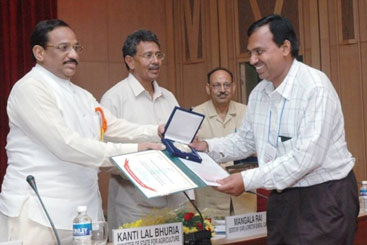 |
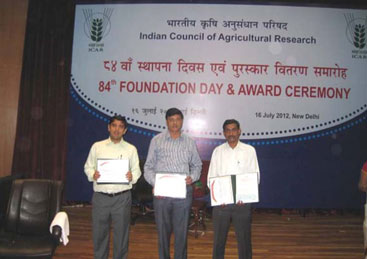 |
| Fakiruddin Ali Ahmed Award | Fakiruddin Ali Ahmed Award1 |
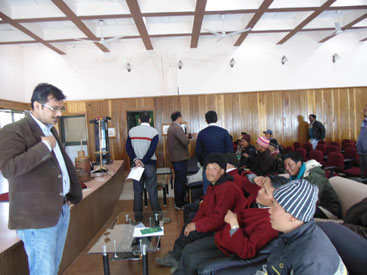 |
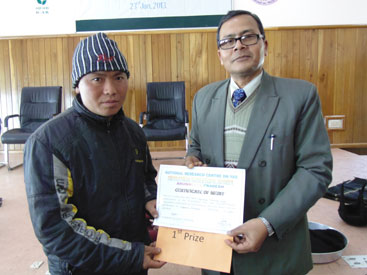 |
| Famers training | Farmers were given certificate of merit and cash prize for their performance and quality of products |
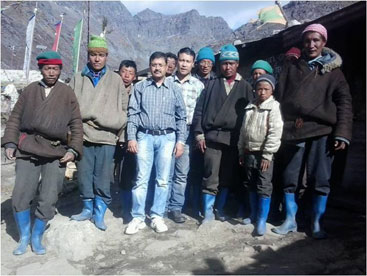 |
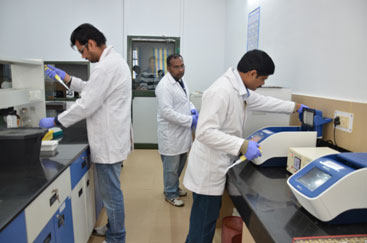 |
| Health-cum-extension camp | ISO-9000 certified Laboratory of NRC on Yak |
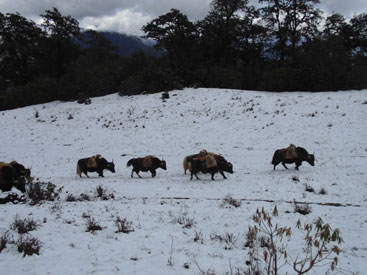 |
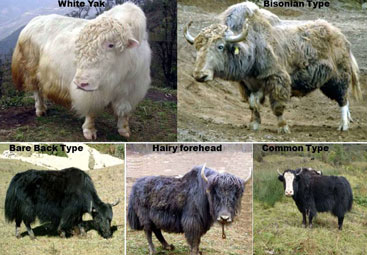 |
| Packabilty testing of Yak, Nykmadun | Phenotypically different Yak |
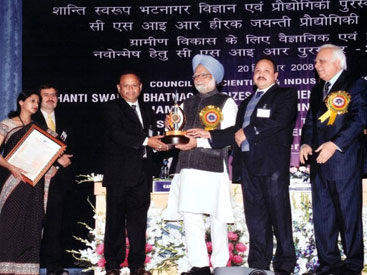 |
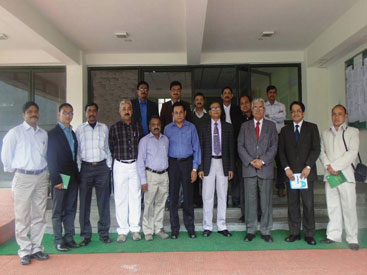 |
| Prestigious CSIR award | Research Advisory Committee Members with Scientists and Technical Officers of NRC on Yak, 7th May, 2013 |
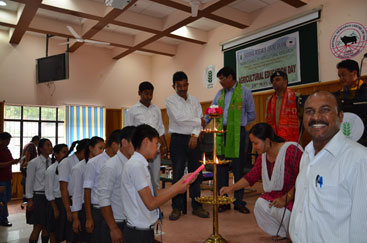 |
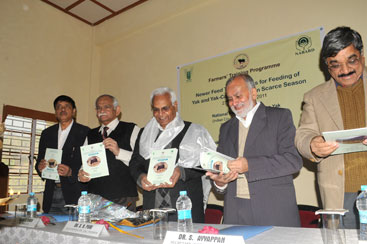 |
| School Student participate in Agricultural Education day at NRC on Yak | Secretary, DARE & DG, ICAR in interactive meeting at NRC on Yak |
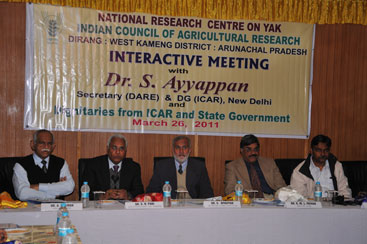 |
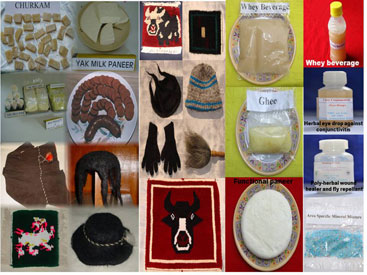 |
| Secretary, DARE & DG, ICAR | Technology and Value added products from yak |
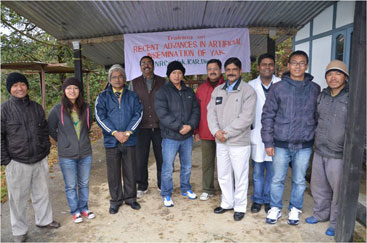 |
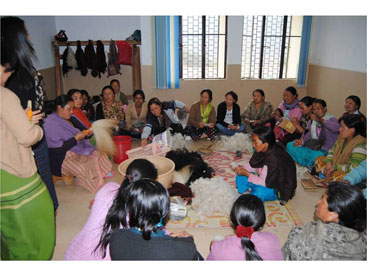 |
| Veterinarians attended the training programme on Recent Advances in Artificial Insemination | Women are trained at NRC on Yak |
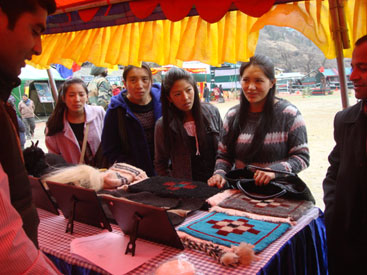 |
|
| Yak Product displaying in Army Mela | |
Technology /intervention available for farmers
- Area specific mineral mixture :- Area specific mineral mixture formulation for yak feeding is prepared with zinc (Zn), copper (Cu), cobalt (Co) and manganese (Mn) in the ratio of 40:20:2:1. Soil, feed and fodder of yak rearing regions are found deficient in certain trace minerals. Feeding mineral deficient feed resources to livestock lead to poor animal health and productivity. The above mentioned area specific mineral formulation is already proved to improve the yak health and production. Area specific minerals can further be supplemented in complete feed blocks made from locally available feed resources. This has an additional advantage of an ease in transport and storage in difficult hilly terrain due to compact size of voluminous feed.
- Herbal eye drop:- Infectious keratoconjunctivitis (pink eye) is a common problem encountered in yaks of India and abroad. The ophthalmic preparation (eye drop) of herbal origin was prepared and found very effective against keratoconjuntivitis in yaks. The study was based on clinical trial in yaks with keratoconjuntivitis. It contains extract of Allium sativum, Saussurea costus and Azadirachta indica. The product is also expected to be effective in other animals with keratocinjunctivitis caused by similar pathogens like Moraxella, Neisseria, Haemophilus as herbal ingredients used here were found effective against them.
- Poly herbal wound healer:- A poly-herbal preparation was prepared using extracts of different medicinal plants like Rubus idaeus, Allium sativum, Saussurea costus and Azadirachta indica, Geranium oil, Calendula and Creosote. The preparation was first tested in experimental mice model and later its clinical efficacy was tested in the farm animals like yak, hill cattle and mithun. Its clinical efficacy was proven in surgical wounds and its external application was also found effective to provide much needed relief for the hot painful swelling of the udder in mastitis.
- Functional paneer from yak milk:- Yak milk paneer is usually prepared with full fat milk having as high as 8.5% fat resulting in 25-30% fat in paneer. Increasing concerns among health conscious consumers demand development of low fat paneer. Interestingly, low fat paneer prepared from yak milk having 1% fat has very hard texture. Therefore, the effect of dietary fibers in improving the product quality of low fat paneer along with enhancement of dietary fiber content of the low fat paneer was undertaken. Among the dietary fibers evaluated, inulin @ 2% was found to be the best choice for incorporation in low fat paneer resulting in significant improvement in the product quality and dietary fiber content of low fat paneer.
- Hand knotted yak coarse hair carpets, wall hangings and foot mats:- Carpets/wall hangings and foot mats are prepared from coarse yak hair fibre with beautiful designs by hand knotted method. There is a great demand of this unique product as a decorative material among the urban dweller
- Yak milk whey beverages incorporated with kiwi fruit pulp:- Whey is a rich source of nutritional and functional components. Whey collected during yak paneer and chura preparations is utilized for making beverages. Beverages from yak milk whey was formulated with 15% sugar, 0.1% coco powder, 0.2% salt, 0.015% caramel flavour, 0.05% alpha-tocopherol and enriched with natural vitamin C by addition of kiwi fruit pulp.
Knowledge input for farmers
- Extension-cum-treatment camp was held at Lubrang and Broksarthang on 8th May, 2012. A total of 120 yaks were treated for ecto and endo parasitic infection, anorexia, skin infestation, weakness, digestive disorder respiratory problem and wound. Yak farmers (Brokpa) were also briefed about scientific managerial practices and technology developed by the institute like complete feed block (CFB) and highland pasture development. They were also made aware of beneficial effect artificial insemination (AI).
- Collaborative mass vaccination-cum-treatment camp for yak and yak hybrid was organized on 30th October, 2012 held at Shanding Thung area in collaboration with Department of A.H., Govt. of Arunachal Pradesh. A total of 10 brokpa families were benefited by mass vaccination and treatment of 434 animals.
- Health-cum-extension camp was held on 31st October, 2012 was held at Sela. A total of 16 brokpa families participated in the camp and 385 pure yaks was treated.
- Collaborative mass vaccination-cum-treatment camp with Department of A.H., Govt. of Arunachal Pradesh for yak and yak hybrid was organized on 22nd November, 2012 at Lagam and Chander area. In this camp 7 brokpa families were covered and 305 yak and yak-cattle hybrid were treated.
- A scientist-farmers interaction was organized on 23rd January, 2013 at NRC-Yak, Dirang. A total of 20 farmers actively participated in the interaction. Farmers were made aware of male sterility, female infertility, nutritional management and deworming schedule of neonatal yak calves. Farmers demonstrated indigenous technology for preparation of yak milk and wool products. Based on their performance and quality of products farmers were given certificate of merit and cash prize.
- A treatment-cum-vaccination camp was held on 24th January, 2013 at Misopsa and Mandalaphudung. A total of 250 yaks were given vaccination against FMD. A total 30 yaks were treated for parasites, anorexia, vitamin deficiency, digestive disorder and respiratory problems. Farmers were also given acaracidal agents to control heamoprotozoan infection.
- Scientists and technical officers organized exhibition stall on 15th August, 2012 and 26th January, 2013 at St. Lopon Stadium, Dirang which was organized by local administration. In the exhibition stall value added products developed by this institute was displayed.
- Two days training programme-cum-workshop was organized for brokpas on Scientific Yak Farming from 28th to 29th January, 2013. A total of 14 farmers actively participated in the workshop.
- Scientists and technical officers actively participated in the occasion of Know Your Army Mela on 25th to 26th February, 2013 at St. Lopon Stadium, Dirang. In the exhibition stall value added products developed by this institute was displayed.
- Training programme on scientific feeding of high altitude animals for better production was organized on 15th March, 2013 at Tawang under AICRP-TSP project. A total of 10 farmers participated in the training programme.
First Test Tube YAK Calf Born at Nyukmadung farm of NRC on YAK
Last Five Years Achievement of National Research Centre on Yak
National Research Centre on Yak is a unique institute of India which provides explicit connection with the nomadic yak farmers (brokpas) and scientific research for development of yak husbandry in India. Yak is a remarkable bovine species. Unlike other bovine species, the animal has been considered as versatile which provides milk, meat, fibre, hide and dung at places where arable farming, including other livestock husbandry, are unavailable. Animal power of yak is also used as pack animal to transport goods in difficult terrain of the Himalaya. This unique species provides livelihood for the highlanders and is deeply intercalated in the culture, religion and social life through known human-animal bond. In spite of uniqueness of this species, yak welfare is a daunting task because of the challenges in terms non-availability of highland pastures, heavy grazing tax, winter feed crisis, threat of trans-boundary diseases, improper breeding policy, and above all the factors the climate change has great impact on yak production and productivity.
National Research Centre on Yak is providing scientific and managemental support to yak farmers through basic and applied research to overcome the challenges. Winter Feed crisis due to low biomass production of pasture and competition with the parallel animal species is a continuous problem in yak husbandry. To intervene the issue scientists of this institute have formulated maize stover based complete feed block (CFB) which takes care of winter feeding with increased milk production in yak. Scientist are also working various reproductive technologies to enhance reproductive performance of yak and to conserve yak germplasm. Where, they were able to produced world first test tube yak calf on 15th July, 2013 named as Norgyal. Scientists have already standardize the cryopreservation of yak semen. Further, identified and characterized male specific genes related to male fertility. Much more emphasises also given on the health aspects of yak where scientists are working on identification of stress factors of biotic and abiotic stressors with migration strategies of impending climate changes. At present scientists are deeply involved in nine institutional projects, five external funded and two network projects. Seven programmes have been taken up on genetic improvement, identification and characterization of novel genes of unique traits, assessment of prevailing management practices and introduction of suitable interventions, development of feeding standard for different categories of yak, development of diagnostic tests and control of diseases, studies on stress physiology under impending climate change scenario, energy budgeting of yak and above all capacity building of yak farmers during the period of XIIth five year plan. National Research Centre on Yak has collaborative research network with the premier research institutes like IVRI and NDRI, IGFRI, NIANP, ICAR Research Complex for NEH Region, NRC on Mithun, West Bengal University of Animal and Fishery Sciences and Assam Agricultural University.
Besides routine research activities scientists and technical officers of the institute are involved in various extension activities, yak health camps and capacity building training for yak farmers and stakeholders. First Yak Mela was organised on 25th November, 2013, where more than 200 brokpas along with their thousands of yaks were shown up. Krishi Vigyan Kendra (KVK) of NRC on Yak have imparted many training programmes with the technical and scientific support of scientist of this institute. National Research Centre on Yak also conducted training some key training programmes on ‘Yak Welfare in Transhumance Rearing System, ‘Documentation of Yak Genetic Resources, ‘Recent Advances in Artificial Insemination, Scientific Feeding of High Altitude Animals for Better Production, First Aid Management of Yak and Yak Farmers, Scientific Yak Farming, Scientific Management of highland Animals during winter, comprising veterinarians, stakeholders and farmers of yak rearing states of the country. To promote lab to land programme and marketing of yak product, Interface and Agribusiness meeting were organised involving stakeholders in policy-making, planning and management.
NRC on yak also take active role to improve awareness about scientific issues of daily life of tribal population of Dirang we observed National Science Day in two spells and World Hepatitis Day under the theme of Hepatitis and Tuberculosis: A Menace to the Highlanders.
This institute has also done commendable work through technology development for last 5 years. After analysing soil web system, area specific mineral mixture has been prepared with zinc, copper, cobalt and manganese which helps to improve yak health and production. Use of CFB developed by NRCY in yak tracts of Arunachal Pradesh has made a breakthrough when yaks are reared in mid-altitude during winter season. Embryo transfer technology (ETT), in vitro fertilisation (IVF)and artificial insemination (AI) will also be helpful in near future for improvement of yak germplasm and production of disease free yak. Since yaks remain in silent heat, synchronization of oestrus through ovsynch protocol and hormone impregnated vaginal sponge has made a contribution not only in terms of synchronization of heat but also in terms of higher conception rate. An ELISA based assay has been developed to measure reproductive hormones from plasma. A poly herbal wound healer cum fly repellent and eye drop have been developed to treat infection arises from wound and kerato-conjunctivitis, respectively. Technologies for value addition of milk have been developed from this institute to earn better economic output by the farmers. Low fat paneer with dietary fibres (2% inulin) helps to prevent cardiovascular diseases and colon cancer. A yak milk whey beverage with kiwi fruit pulp developed by NRCY is helpful to combat vitamin C deficiency. Sausages from yak meat, pork and fat have been also accepted by the consumers due to its flavour, texture, juiciness and tenderness. Technologies for making chawar (holy duster), cap and carpets have been also developed by this research institute. The various technologies of value addition developed by NRC on Yak have been trained to the yak farmers and local tribes.
Due to systematic approach in research, extension and administration, this institute has been accredited with ISO 9001:2008 from 21st March, 2013.
Technology /intervention available for farmers/others-bulleted forms with a brief note
- Area specific mineral mixture
Area specific mineral mixture formulation for yak feeding is prepared with zinc (Zn), copper (Cu), cobalt (Co) and manganese (Mn) in the ratio of 40:20:2:1. Soil, feed and fodder of yak rearing regions are found deficient in certain trace minerals. Feeding mineral deficient feed resources to livestock lead to poor animal health and productivity. The above mentioned area specific mineral formulation is already proved to improve the yak health and production. Area specific minerals can further be supplemented in complete feed blocks made from locally available feed resources. This has an additional advantage of an ease in transport and storage in difficult hilly terrain due to compact size of voluminous feed
- Herbal eye drop
Infectious keratoconjunctivitis (pink eye) is a common problem encountered in yaks of India and abroad. The ophthalmic preparation (eye drop) of herbal origin was prepared and found very effective against keratoconjuntivitis in yaks. The study was based on clinical trial in yaks with keratoconjuntivitis. It contains extract of Allium sativum, Saussurea costus and Azadirachta indica. The product is also expected to be effective in other animals with keratocinjunctivitis caused by similar pathogens like Moraxella, Neisseria, Haemophilus as herbal ingredients used here were found effective against them.
- Poly herbal wound healer
A poly-herbal preparation was prepared using extracts of different medicinal plants like Rubus idaeus, Allium sativum, Saussurea costus and Azadirachta indica, Geranium oil, Calendula and Creosote. The preparation was first tested in experimental mice model and later its clinical efficacy was tested in the farm animals like yak, hill cattle and mithun. Its clinical efficacy was proven in surgical wounds and its external application was also found effective to provide much needed relief for the hot painful swelling of the udder in mastitis.
- Functional paneer from yak milk
Yak milk paneer is usually prepared with full fat milk having as high as 8.5% fat resulting in 25-30% fat in paneer. Increasing concerns among health conscious consumers demand development of low fat paneer. Interestingly, low fat paneer prepared from yak milk having 1% fat has very hard texture. Therefore, the effect of dietary fibers in improving the product quality of low fat paneer along with enhancement of dietary fiber content of the low fat paneer was undertaken. Among the dietary fibers evaluated, inulin @ 2% was found to be the best choice for incorporation in low fat paneer resulting in significant improvement in the product quality and dietary fiber content of low fat paneer.
- Hand knotted yak coarse hair carpets, wall hangings and foot mats
Carpets/wall hangings and foot mats are prepared from coarse yak hair fibre with beautiful designs by hand knotted method. There is a great demand of this unique product as a decorative material among the urban dweller.
- Yak milk whey beverages incorporated with kiwi fruit pulp
Whey is a rich source of nutritional and functional components. Whey collected during yak paneer and chura preparations is utilized for making beverages. Beverages from yak milk whey was formulated with 15% sugar, 0.1% coco powder, 0.2% salt, 0.015% caramel flavour, 0.05% alpha-tocopherol and enriched with natural vitamin C by addition of kiwi fruit pulp.
Knowledge input for farmers
- Extension-cum-treatment camp was held at Lubrang and Broksarthang on 8th May, 2012. A total of 120 yaks were treated for ecto and endo parasitic infection, anorexia, skin infestation, weakness, digestive disorder respiratory problem and wound. Yak farmers (Brokpa) were also briefed about scientific managerial practices and technology developed by the institute like complete feed block (CFB) and highland pasture development. They were also made aware of beneficial effect artificial insemination (AI).
- Collaborative mass vaccination-cum-treatment camp for yak and yak hybrid was organized on 30th October, 2012 held at Shanding Thung area in collaboration with Department of A.H., Govt. of Arunachal Pradesh. A total of 10 brokpa families were benefited by mass vaccination and treatment of 434 animals.
- Health-cum-extension camp was held on 31st October, 2012 was held at Sela. A total of 16 brokpa families participated in the camp and 385 pure yaks was treated.
- Collaborative mass vaccination-cum-treatment camp with Department of A.H., Govt. of Arunachal Pradesh for yak and yak hybrid was organized on 22nd November, 2012 at Lagam and Chander area. In this camp 7 brokpa families were covered and 305 yak and yak-cattle hybrid were treated.
- A scientist-farmers interaction was organized on 23rd January, 2013 at NRC-Yak, Dirang. A total of 20 farmers actively participated in the interaction. Farmers were made aware of male sterility, female infertility, nutritional management and deworming schedule of neonatal yak calves. Farmers demonstrated indigenous technology for preparation of yak milk and wool products. Based on their performance and quality of products farmers were given certificate of merit and cash prize.
- A treatment-cum-vaccination camp was held on 24th January, 2013 at Misopsa and Mandalaphudung. A total of 250 yaks were given vaccination against FMD. A total 30 yaks were treated for parasites, anorexia, vitamin deficiency, digestive disorder and respiratory problems. Farmers were also given acaracidal agents to control heamoprotozoan infection.
- Scientists and technical officers organized exhibition stall on 15th August, 2012 and 26th January, 2013 at St. Lopon Stadium, Dirang which was organized by local administration. In the exhibition stall value added products developed by this institute was displayed.
- Two days training programme-cum-workshop was organized for brokpas on Scientific Yak Farming from 28th to 29th January, 2013. A total of 14 farmers actively participated in the workshop.
- Scientists and technical officers actively participated in the occasion of Know Your Army Mela on 25th to 26th February, 2013 at St. Lopon Stadium, Dirang. In the exhibition stall value added products developed by this institute was displayed.
- raining programme on scientific feeding of high altitude animals for better production was organized on 15th March, 2013 at Tawang under AICRP-TSP project. A total of 10 farmers participated in the training programme.
- A three days training programme for veterinary officers of Arunachal Pradesh was organized from 21st to 23rd March, 2013. A total of 10 veterinarians attended the training programme on Recent Advances in Artificial Insemination.
- A two days training programme was organized on first aid management of yak and brokpa from 28th to 29th March, 2013. A total of 44 yak farmers participated in the programme. Farmers were given first aid boxes both for them and their animals.